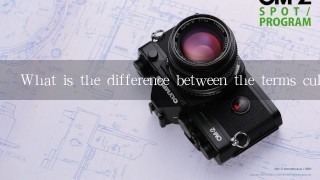What is the difference between the terms culture and identity?

Culture and identity are two of the most important concepts in sociology. Culture refers to the shared beliefs, values, and practices of a group of people. Identity, on the other hand, refers to the way in which individuals perceive themselves and their place in the world.
Culture is shaped by the environment in which it is developed, and it can change over time. Identity, on the other hand, is more fluid and can be shaped by both the environment and individual experiences.
Culture also includes the arts, literature, and other forms of expression that reflect the values and beliefs of a group of people. Identity, on the other hand, is more personal and can be shaped by individual experiences, values, and beliefs.
Culture and identity are both important for understanding human behavior and social interactions. By understanding the differences between these two concepts, we can better understand how people are shaped by their environment and how they perceive themselves and their place in the world.
Here are some examples of how culture and identity can differ:
- Culture: In some cultures, it is considered important to respect authority figures, while in other cultures, this is not the case.
- Culture: In some cultures, there is a strong emphasis on individualism, while in other cultures, there is a strong emphasis on collectivism.
- Culture: In some cultures, there is a strong emphasis on tradition, while in other cultures, there is a strong emphasis on innovation.
- Identity: In some cultures, individuals are expected to conform to certain roles and behaviors, while in other cultures, individuals are more free to express their individuality.
Culture and identity are two of the most important concepts in sociology. By understanding the differences between these two concepts, we can better understand how people are shaped by their environment and how they perceive themselves and their place in the world.

















































